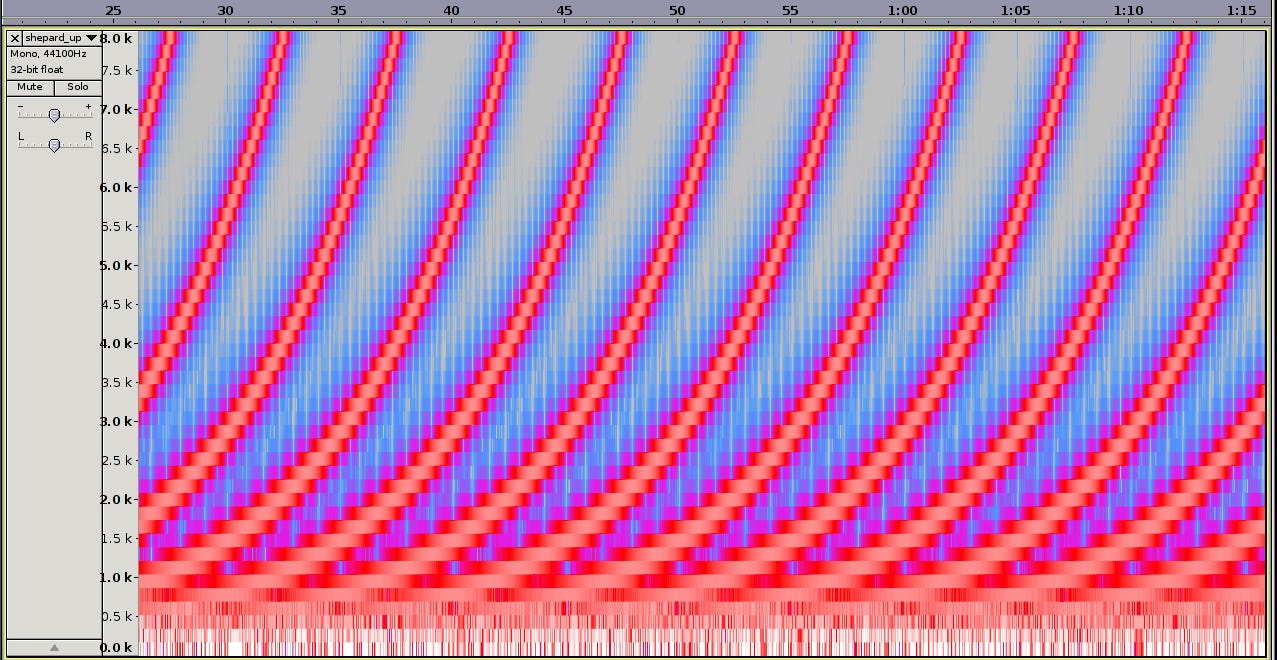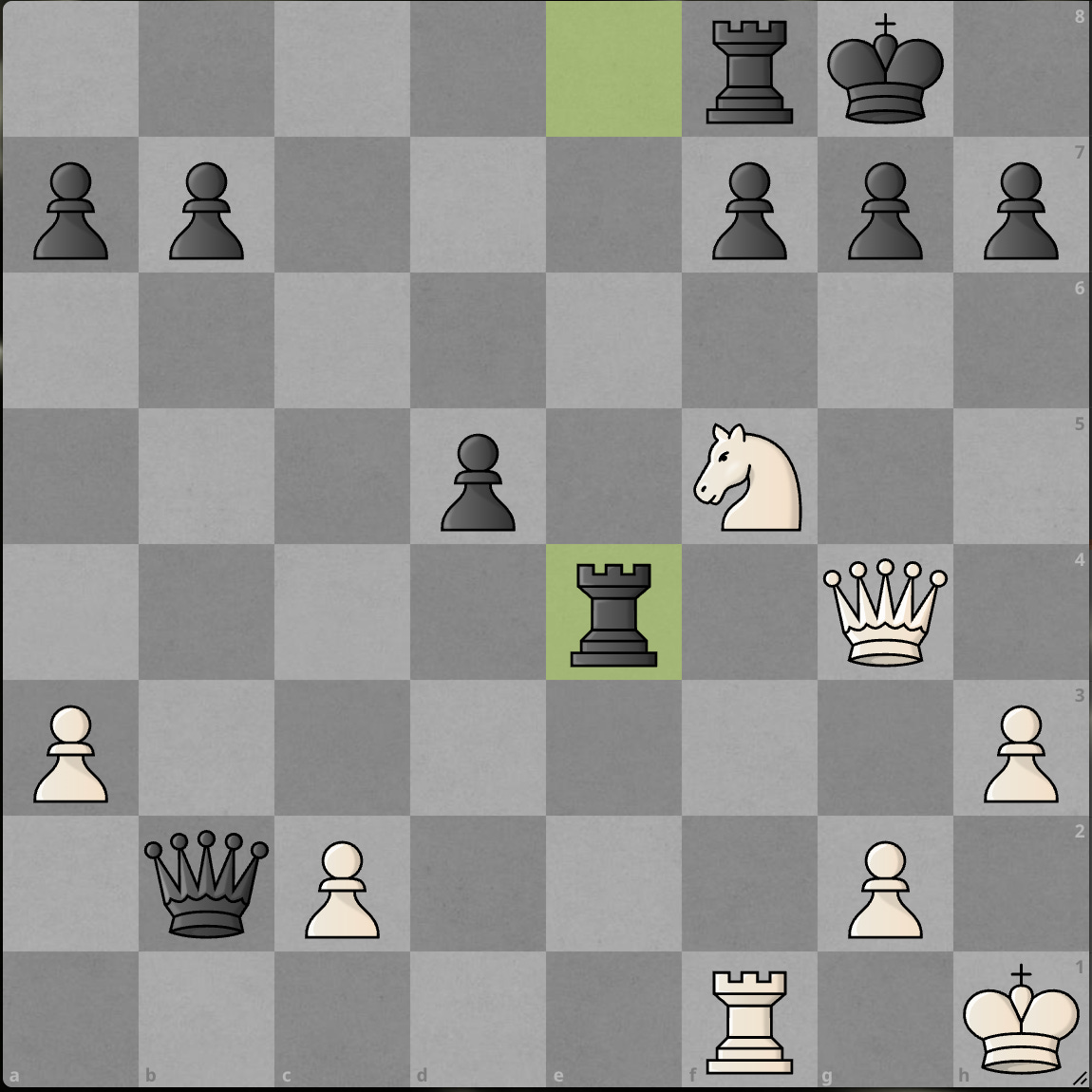How the World Forgot to End
A Note on Shepard Tones and the Midnight Sun
There are strange things done in the midnight sun
By the men who moil for gold;
The Arctic trails have their secret tales
That would make your blood run cold;
The Northern Lights have seen queer sights,
But the queerest they ever did see
Was that night on the marge of Lake Lebarge
I cremated Sam McGee.
Robert Service’s famous poem, The Cremation of Sam McGee, is a staple of Canadian education. My old English teacher, Mr. Brown – a wonderful poet himself – used to promise an A+ on their final exam to any student who could recite Sam McGee perfectly from heart. As it happens, our school was only 48 kilometers from Lake Laberge.
One of the haunting things about life in the far reaches of the Northern Hemisphere is the midnight sun. During summer, it’s light well after midnight. More or less every creature there, from moose to humans, mobilizes into a frenzy of activity, making the most out of those months.
And now life, everywhere, feels as if it’s lived under a midnight sun. The lights are almost always on, the information environment glowing hot in an apparently unceasing crescendo, and no natural way to turn it all off.
We are like a polar traveller who toils under an illusion of infinite sunrise; every new crisis and breakthrough seems to raise the pitch but, like an endless Shepard glissando, we end on a higher note of concern with no finality.
What is it like to live in this world?
Music without Musicalization
Turn on the news, and you’ll notice a certain rhythm: one alert rises, then another, and another, but the story never ends with a satisfying chord. Every political scandal or geopolitical incident is framed as an escalation. We keep climbing the scale, but the summit never arrives.

It’s music without the musicalization, as Ben Zucker might put it. There’s a lack of poetry in most feed-based media today, whether mainstream or alternative, despite the feverish pitch it possesses. Even the messaging around elections, like “this might be the last one” hints towards finality, but that never arrives.
Part of the reason we feel endlessly on edge is because of how attuned we are to negative events. Not only do they stick with us, but crises, wars, and glooms make great news – and the more rare they are, the better. The soundtrack to our lives is now made of Shepard Tones. What we deem to be the worst events, the ones with shock factor, are registered and amplified almost automatically – often leading us to overestimate the extent to which they exist.
The availability of these images and sounds grips our mind like a Shepard Tone.
At the same time, we live in a near-constant state of surveillance. But instead of choreographing ourselves around important and chronic issues, we swarm to flashes in the pan like cracked-out moths.
Problems have a certain pattern to them that you can manage. That’s the reason that protocols have a kind of musical element to them. Protocols take the shape of the trade-offs and conflicts that they’re pointed at. But the omnipresence of these Shepard Tones keeps us churning, formless.
Aspartame Martyrs
A machine that produces constant climax must fabricate martyrs and scapegoats. The past several years have put this dynamic on full display, with anyone being able to become not just the Internet’s “main character of the day”, but a serious, real-world totem.
While history has seen its fair share of scapegoating, we’re seeing more aspartame martyrs. Real people, turned into a digital pulp, that let us simulate a fight against evil without really confronting the complex forces at play.
It’s just as shameful to speak ill of the recently deceased as it is to make anagrams of their epitaph.
Even in The Cremation of Sam McGee, the narrator grants his friend the final wish and relief. Closure doesn’t exist naturally in the century of the Shepard Tone – at least at scale. It must be manufactured in vats of acid.
All the world’s a stage and the aspartame martyrs aren’t the only act. Another notable one is the theater of autarky. Some political parties in the West that run on a platform of self-sufficiency (autarky) can’t actually do that. Mature economies depend on a supply of cheap labor, and therefore when fauxtarky platforms win, they must pretend to be hard on immigration and trade. If they actually cracked down, that would obliterate GDP.
Trails and Bridges
Living under the midnight sun means we must navigate a widening gyre. On one hand looms the macro: planetary issues and systems, from climate to tech. On the other hand, we have the micro: our personal routines, our intimate bonds, which localize the world into hand-held size.
Between these scales lies the meso – communities, institutions, metropolises, and cosmopolises – and it is there that meaning often coagulates. The meso level intermediates between the individual and the global. Without attention to the meso, we either lose ourselves in the glare of sunny anonymity or get trapped in solipsism, retreating to finding the perfect, free-range cordyceps mushroom powder for our morning coffee routines.
Same for Shepard Tones – at the micro, they are just a series of sounds. At the macro, they are an illusion of a neverending rise in pitch. But if you were to focus on the meso, you’d see the thing for what it really is. Maybe that’s a painful degree of awareness, but it’s also what you need to build bridges and trails that are eroding under the constant background radiation of our information environment.
Another reason it’s important to focus on the meso: it’s doable but meaningfully ambitious.
The Art of Filtering Light
Are Pit Vipers and Ray-Bans safety protocols? They might be.
I think the trick in this strange new world is to keep an eye on the ball. And since we’re playing in constant broad daylight, sunglasses can make that easier, since. Plus… they look cool. You don’t want to hide behind them, as some people are apt to, but they are, metaphorically speaking, a good investment.
By default most people start out focused too much on the micro or on the macro. You have to get the right lenses to push your view to the right resolution (to see the meso scale of things).
This is a messy analogy. Our window to the world is usually our phone and its feeds. And those are nebulous things – dialing them just right isn’t easy, as I’ve written about in Black Blobs, not Black Boxes. But that’s just reality; part of living under the Midnight Sun is knowing that you are the second settings panel on all of your devices.
And that’s an uphill battle. I think that social media is a net positive since it sheds light on important issues, but the two main negative externalities are the ubiquitous Shepard Tone and the widespread sapping of attention. There’s some advice on how to fashion your own sunglasses for this world in Black Blobs, but it’s not perfect.
Two other ways to filter light, so you can focus on the meso:
Target the boulders, not the pebbles. Like people that want to get healthy overindex on supplements instead of cardio, it’s important not to get lost in the weeds. Showing up every day, working hard, taking care of yourself, being candid, trying to leave things better than you found them… those are the boulders.
Accept the anxiety. The right amount of anxiety isn’t zero. If you feel like you have surplus anxiety, try using it to move boulders. More on that here.
Sometimes when people visit the far North, they say that it feels alien. They’re right. It’s an otherworldly sensation to live under a sun that never sets. But those Northerners manage – and they’ve developed a reputation for industriousness – so I’m optimistic the rest of the world will too.



It’s nice to see humour making its way into the protocol discussion.
Regarding the internet eating the news, a few thoughts related to the other article on making the internet a place to hang out
1 One thing I remember from the pre internet era is how you didn't necessarily read the news alone so much as watch TV together or even newspaper in a park or on a train would offered involve honestly strangers asking each other to if they were done with the newspaper
2 there's something very much to the issue where a constant drip of global doom across all feeds is very much anxiety and DC in subtle ways that's obvious and tried to say but then also a big shift. Sometimes I go to Media outlets I used to read like say wired or whatever and it's pretty striking how much the culture were and other things just kind of subtly pervade well everything. It's not good for the human animal when there's not opportunities for rest and relaxation
3 I wonder about the opportunity to build protocols as a pathway to institutions at the Nexus between URL and IRL. I'm thinking of the internet equivalent of friends don't let friends drive drunk. I was chatting with some new friends who I play pickup soccer with on Sundays about the idea of having some sort of test or license or other similar thing before people could use certain parts of the public internet. Like social media and Facebook or whatever. Stump stuff is just insanely bad and I can't believe that the so-called adults are letting stuff like this happen. for example in my hometown there was an instance last year where there's a whole social media mob convinced there was a homeless person in a canyon but there was no homeless person it was just like group psychosis or something
4 there are a lot of examples like the last one in three red large if we are honest with ourselves about the state of what passes for discourse. I said I don't do tend to think that you know eliminating gatekeepers has been on net positive and does open the door to new and non-trividly battle worlds like what the you know more federated polycentric governance crowd at the network state got a bladder or the edge city crowd or all that kind of stuff or trying to build. Of course there's the mega question of how we get from our current foster clock into a better equilibrium without a war or other cataclysm which are the typical step change functions historically. I would also note that I think that some of those network techno network state network city network nation network everything crowd neglect the impacts that putting those ideas out there can also lead to backlash. Reactionaries can feed off of revolutionaries.
Anyhoo just a few thoughts that went in a few different directions reading civil of your posts and restacks this morning. Thanks for sharing it was enjoyable while I did my morning spin and stretch with voice to text. Be well sir